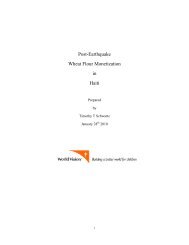Food Consumption Patterns Part 2
You also want an ePaper? Increase the reach of your titles
YUMPU automatically turns print PDFs into web optimized ePapers that Google loves.
81<br />
Government vs. Merchant Elite: Who Controls of the Market<br />
Government Regulations, Standards and Quality Control<br />
The incursion described above of low quality manufactured ready-to-eat foods and beverages on<br />
the Haitian popular market has occurred in the context of weak government and the de facto<br />
absence of controls and consumer protection.<br />
Oversight of production and processing of foods and quality control falls under the auspices of the<br />
Ministry of Commerce. In Avis CI/0009 dated February 2010, the ministry reaffirmed that,<br />
Alimentary products should be healthy, appropriately packaged and risk free, meaning<br />
processed, prepared and conserved in hygienic conditions. They should also be accurately<br />
labeled with the following information,<br />
<br />
<br />
<br />
<br />
<br />
<br />
Name of food type<br />
List of all the food ingredients by order of decreasing proportion<br />
Name and address of the manufacturer, conditioner, and distributor<br />
Date of manufacture<br />
Date of expiration<br />
Lot number<br />
In November 2012, with support from EU, MINUSTAH, the German Institution for<br />
Standardization, UNIDO, and the government of Brazil, and more $5 million Euros, MIC officially<br />
inaugurated the Haitian Bureau of Standards (Bureau Haïtien de Normalisation or BHN). The<br />
BHN’s tasks were to devise and implement standards for production and trade in the country, to<br />
train inspectors in applying the standards and enforcing compliance with labeling, quality<br />
certification, and international product standardization. In addition to governing the local market,<br />
the MIC assured the public that "made in Haiti" would “soon be definitely recognized in the<br />
international market.” The undertaking was backed up by a new “Metrology Laboratory” where<br />
products could be tested for compliance with hygiene safety standards.<br />
There are some problems with the claims. Although the Ministry of Commerce boasts a “brigade<br />
of inspectors that strictly applies these laws and punishes non-conformance,” observations on the<br />
ground and from interviews with government officials confirms that in 2014-2015,<br />
<br />
<br />
<br />
BHN, the laboratory, and the Ministry do very little. To quote an official at the Direction<br />
de Controle de Qualite des Produits, “so long as a product doesn’t kill someone it can be<br />
imported and sold on the local market.” 2<br />
Factory samples of locally made products tested are those brought in by the producers<br />
themselves, i.e. they can bring whatever they want to be tested as a sample<br />
Despite the laws: labeling, controls, and inspection are, de facto, non-existent, meaning<br />
that respecting the laws above puts manufacturers at a competitive disadvantage relative to<br />
non-compliant rivals<br />
2<br />
“depi pwodwi ya pap touye moun yo ka enpote'l jan yo vle sou mache ya"
















